#disney layoffs
Text
Disney has just layed off 7,000 people. How tf are they making Frozen 3, Zootopia 2 AND Toy Story 5.
7 notes
·
View notes
Text
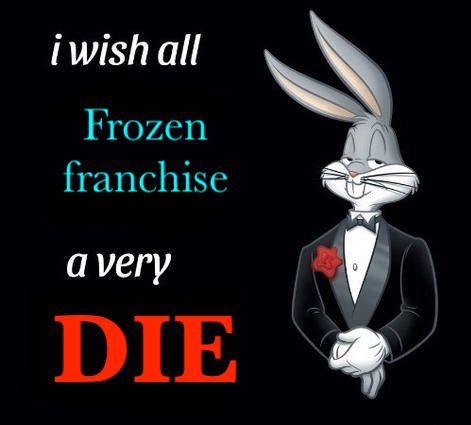
7.000 fucking lay-offs and terrible movies, congrats Disney.
2 notes
·
View notes
Text

1 note
·
View note
Text
End of the Line
How 7,000 Disney layoffs could effect the Parks. Also, a ride on the newly reopened Walt Disney World Railroad and why Bobby hates it.
#CODP #disney100 #disney7000 #notclub33 #wdwrr #disneypodcast
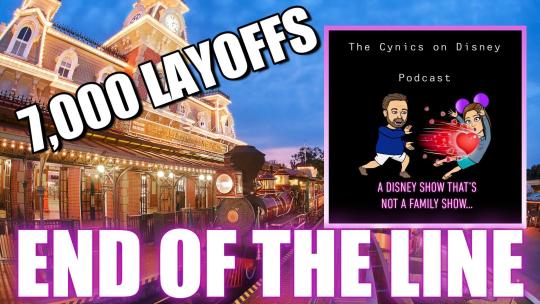
View On WordPress
#Cynical Disney#Cynics on Disney#Disney 7000 Layoffs#Disney Layoffs#Magic Kingdom#walt disney world#Walt Disney World Railroad
0 notes
Text
These "tax write-offs" don't point to how streaming companies are losing money...
...rather to how much money they can afford to burn.
Like... movies cost tons of money.
A TV episode alone costs tons of money.
Anti-Union exploitation may be part of the production but pouring so much into something that may only see the light of day for a week if at all is a waste.
A waste of art that these companies claim to value and a waste of money that they sunk into these projects.
All those titles they wrote off? They could've made them that sweet, sweet green that makes them squirt in their slacks.
But nooooooo, it's the threat they and their shareholder overloads hold whenever they have to see numbers go down in their personal bank accounts.
It's about conceding to those they consider "beneath them" that their wrongdoings aren't "just business."
#tax write offs#streaming services#streaming#hbo max#disney+#disneyplus#labor unions#union strong#union solidarity#sag strike#sag aftra#wga strike#hollywood strike#netflix#layoffs
17 notes
·
View notes
Text


BYE FELICIA
#marvel#mcu#the avengers#marvel comics#the advocate for layoffs got LAID OFF LMAO#power move#it took so looong so long to get rid of this guy#AHAHAHAHA#the evil is defeated#disney#falcon and winter soldier#the loki series#she hulk#hawkeye#marvel cinematic universe#loki
32 notes
·
View notes
Text
NatGeo Lays Off More Writers. :(
In probably the saddest news for me this week, National Geographic has layed off the last remaining staff writers.
It was a matter of time, I suppose, with the Internet shaking things up for better and worse, and with National Geographic being a business – but how many of us have really considered National Geographic a business? In many ways, it is akin to the BBC in showing us our world, so…
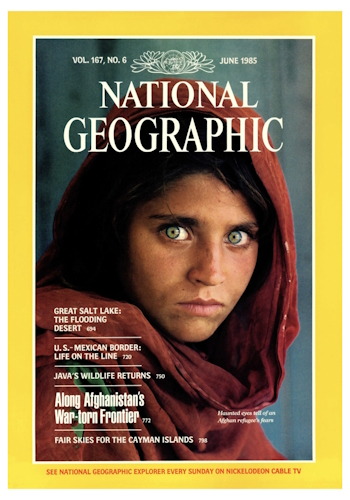
View On WordPress
2 notes
·
View notes
Text
Disney layoffs

6 notes
·
View notes
Text
Exclusive: Walt Disney's Pixar targets 'Lightyear' execs among 75 job cuts | Reuters
Oh, that's shitty
0 notes
Text
Via mxdwn MOVIES: Disney Starts Third Round Of Layoffs, Keeping CEO Bob Iger’s Three Round Promise
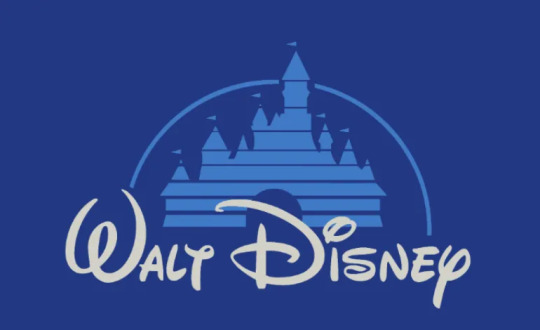
https://movies.mxdwn.com/news/disney-starts-third-round-of-layoffs-keeping-ceo-bob-igers-three-round-promise/
0 notes
Text
HULU LAYS OFF WORKERS…IN CHINA!!!!
Why it the world would be a good idea in the first place for Communist China to have a research and development team in China for Disney owned Hulu shows just how stupid this is. With all the data going through them I find this disturbing in the first place. Hulu is not even streaming in China, so why in the hell did they have access to development and research with Hulu’s algorithms. Someone…
View On WordPress
0 notes
Text
I thought @disneystudios was doing okay! I am also surprised by the news about @netflix (which is good for the latter).
If Disney does end up carrying out a round of layoffs, it’ll be far from the only one among the companies pushing streaming services. Dozens of workers have lost their jobs at Warner Bros. Television and HBO Max this year. Netflix has also laid off hundreds of employees this year while reporting slower subscriber growth but noted during the last earnings call that its business remains profitable, unlike its premium streaming competitors, which include Disney.
Hopefully the entertainment industry will recover during this pending recession that may affect the planet.
0 notes
Note
On the whole SE thing, I have a question because I agree with you fully about the AI crap, but I have been full hyperfixation excited for Rebirth, which is saying a lot because life has been soul sucking shit and mustering enthusiasm for anything has been an uphill battle. Where is the line for supporting a cause you firmly believe in, and self indulgence that contradicts that for the sake of personal pleasure? It feels like I either stick to the fight and let something positive to me go or ignore it for myself, which just feels selfish and wrong. This has been eating at me since that news dropped and I don't know if there is a right answer or if any of this even makes sense outside of my own mad rambling. Any input?
13,000+ people were laid off just within the video game industry last year. All the big corps who did those layoffs said “no, Ai won’t replace anyone” and then announced heavy dealings with Ai generated writing, art, animation, etc.
Over 13,000 people… and that’s just in video games.
That’s not counting other branches of the entertainment industry which have also said “no, Ai won’t replace anyone” and then also announced they’d be dipping into Ai generated writing, art, animation, etc after doing massive layoffs.
And if you’re thinking “Ai isn’t that far along” - Disney used Ai generated content for the intro to one of its Marvel Disney+ series last year, SE already has Ai artwork in their games and in their promotional materials, and Valve now allows generative Ai (artwork, animations, assets, voices, etc) developed games on their platform.
The only thing businesses, corporations, CEOs/Owners, etc understand is money. If you talk big talk on social media and can’t back that talk up by not buying a thing, they’ll just use the money you gave them to prove you wrong.
The generative Ai companies have already shown their whole ass by having massive lists leaked of artists, animators, voice actors, musicians, etc that they’ve stolen from. You can’t even pretend “well maybe it’s actually ethical and they asked permission” when there are lawsuits from artists of all kinds, bug and small, trying to take these generative Ai companies down for outright stealing their work to train their Ai program.
There’s a whole world of games, movies, books, etc out there to enjoy that don’t steal people’s works and cut people’s jobs to make “quick and easy content for cheap” - find something different to enjoy.
But, quite frankly, anytime I speak my piece about ethical treatment of workers I’m either ignored or harassed so it honestly feels like it doesn’t matter what I say despite dealing with shit like this from multiple sides of the industry and from people for 17 years.
So you do what you wanna do, you’re a whole person yourself and can make your own choices and draw your own line in the sand.
However, not only was I one of those affected TWICE by layoffs because of this, but countless of my friends and colleagues were also let go in favor of building cheaper things with Ai.
123 notes
·
View notes
Text
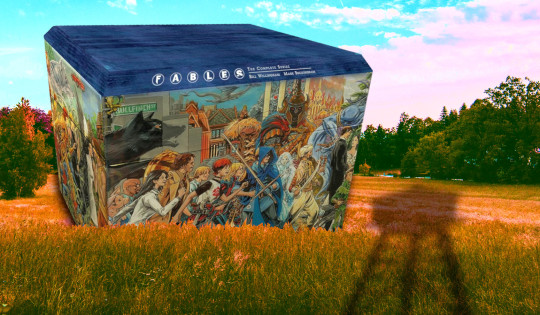
On September 22, I'm (virtually) presenting at the DIG Festival in Modena, Italy. On September 27, I'll be at Chevalier's Books in Los Angeles with Brian Merchant for a joint launch for my new book The Internet Con and his new book, Blood in the Machine.

It's been 21 years since Bill Willingham launched Fables, his 110-issue, wide-ranging, delightful and brilliantly crafted author-owned comic series that imagines that the folkloric figures of the world's fairytales are real people, who live in a secret society whose internal struggles and intersections with the mundane world are the source of endless drama.
Fables is a DC Comics title; DC is division of the massive entertainment conglomerate Warners, which is, in turn, part of the Warner/Discovery empire, a rapacious corporate behemoth whose screenwriters have been on strike for 137 days (and counting). DC is part of a comics duopoly; its rival, Marvel, is a division of the Disney/Fox juggernaut, whose writers are also on strike.
The DC that Willingham bargained with at the turn of the century isn't the DC that he bargains with now. Back then, DC was still subject to a modicum of discipline from competition; its corporate owner's shareholders had not yet acquired today's appetite for meteoric returns on investment of the sort that can only be achieved through wage-theft and price-gouging.
In the years since, DC – like so many other corporations – participated in an orgy of mergers as its sector devoured itself. The collapse of comics into a duopoly owned by studios from an oligopoly had profound implications for the entire sector, from comic shops to comic cons. Monopoly breeds monopoly, and the capture of the entire comics distribution system by a single company – Diamond – was attended by the capture of the entire digital comics market by a single company, Amazon, who enshittified its Comixology division, driving creators and publishers into Kindle Direct Publishing, a gig-work platform that replicates the company's notoriously exploitative labor practices for creative workers. Today, Comixology is a ghost-town, its former employees axed in a mass layoff earlier this year:
https://gizmodo.com/amazon-layoffs-comixology-1850007216
When giant corporations effect these mergers, they do so with a kind of procedural kabuki, insisting that they are dotting every i and crossing every t, creating a new legal entity whose fictional backstory is a perfect, airtight bubble, a canon with not a single continuity bug. This performance of seriousness is belied by the behind-the-scenes chaos that these corporate shifts entail – think of the way that the banks that bought and sold our mortgages in the run-up to the 2008 crisis eventually lost the deeds to our houses, and then just pretended they were legally entitled to collect money from us every month – and steal our houses if we refused to pay:
https://www.reuters.com/article/idINIndia-58325420110720
Or think of the debt collection industry, which maintains a pretense of careful record-keeping as the basis for hounding and threatening people, but which is, in reality, a barely coherent trade in spreadsheets whose claims to our money are matters of faith:
https://pluralistic.net/2023/08/12/do-not-pay/#fair-debt-collection-practices-act
For usury, the chaos is a feature, not a bug. Their corporate strategists take the position that any ambiguity should be automatically resolved in their favor, with the burden of proof on accused debtors, not the debt collectors. The scumbags who lost your deed and stole your house say that it's up to you to prove that you own it. And since you've just been rendered homeless, you don't even have a house to secure a loan you might use to pay a lawyer to go to court.
It's not solely that the usurers want to cheat you – it's that they can make more money if they don't pay for meticulous record-keeping, and if that means that they sometimes cheat us, that's our problem, not theirs.
While this is very obvious in the usury sector, it's also true of other kinds of massive mergers that create unfathomnably vast conglomerates. The "curse of bigness" is real, but who gets cursed is a matter of power, and big companies have a lot more power.
The chaos, in other words, is a feature and not a bug. It provides cover for contract-violating conduct, up to and including wage-theft. Remember when Disney/Marvel stole money from beloved science fiction giant Alan Dean Foster, whose original Star Wars novelization was hugely influential on George Lucas, who changed the movie to match Foster's ideas?
Disney claimed that when it acquired Lucasfilm, it only acquired its assets, but not its liabilities. That meant that while it continued to hold Foster's license to publish his novel, they were not bound by an obligation to pay Foster for this license, since that liability was retained by the (now defunct) original company:
https://pluralistic.net/2022/04/30/disney-still-must-pay/#pay-the-writer
For Disney, this wage-theft (and many others like it, affecting writers with less fame and clout than Foster) was greatly assisted by the chaos of scale. The chimera of Lucas/Disney had no definitive responsible party who could be dragged into a discussion. The endless corporate shuffling that is normal in giant companies meant that anyone who might credibly called to account for the theft could be transfered or laid off overnight, with no obvious successor. The actual paperwork itself was hard for anyone to lay hands on, since the relevant records had been physically transported and re-stored subsequent to the merger. And, of course, the company itself was so big and powerful that it was hard for Foster and his agent to raise a credible threat.
I've experienced versions of this myself: every book contract I've ever signed stipulated that my ebooks could not be published with DRM. But one of my publishers – a boutique press that published my collection Overclocked – collapsed along with most of its competitors, the same week my book was published (its distributor, Publishers Group West, went bankrupt after its parent company, Advanced Marketing Services, imploded in a shower of fraud and criminality).
The publisher was merged with several others, and then several more, and then several more – until it ended up a division of the Big Five publisher Hachette, who repeatedly, "accidentally" pushed my book into retail channels with DRM. I don't think Hachette deliberately set out to screw me over, but the fact that Hachette is (by far) the most doctrinaire proponent of DRM meant that when the chaos of its agglomerated state resulted in my being cheated, it was a happy accident.
(The Hachette story has a happy ending; I took the book back from them and sold it to Blackstone Publishing, who brought out a new expanded edition to accompany a DRM-free audiobook and ebook):
https://www.blackstonepublishing.com/overclocked-bvej.html
Willingham, too, has been affected by the curse of bigness. The DC he bargained with at the outset of Fables made a raft of binding promises to him: he would have approval over artists and covers and formats for new collections, and he would own the "IP" for the series, meaning the copyrights vested in the scripts, storylines, characters (he might also have retained rights to some trademarks).
But as DC grew, it made mistakes. Willingham's hard-fought, unique deal with the publisher was atypical. A giant publisher realizes its efficiencies through standardized processes. Willingham's books didn't fit into that standard process, and so, repeatedly, the publisher broke its promises to him.
At first, Willingham's contacts at the publisher were contrite when he caught them at this. In his press-release on the matter, Willingham calls them "honest men and women of integrity [who] interpreted the details of that agreement fairly and above-board":
https://billwillingham.substack.com/p/willingham-sends-fables-into-the
But as the company grew larger, these counterparties were replaced by corporate cogs who were ever-more-distant from his original, creator-friendly deal. What's more, DC's treatment of its other creators grew shabbier at each turn (a dear friend who has written for DC for decades is still getting the same page-rate as they got in the early 2000s), so Willingham's deal grew more exceptional as time went by. That meant that when Willingham got the "default" treatment, it was progressively farther from what his contract entitled him to.
The company repeatedly – and conveniently – forgot that Willingham had the final say over the destiny of his books. They illegally sublicensed a game adapted from his books, and then, when he objected, tried to make renegotiating his deal a condition of being properly compensated for this theft. Even after he won that fight, the company tried to cheat him and then cover it up by binding him to a nondisclosure agreement.
This was the culmination of a string of wage-thefts in which the company misreported his royalties and had to be dragged into paying him his due. When the company "practically dared" Willingham to sue ("knowing it would be a long and debilitating process") he snapped.
Rather than fight Warner, Willingham has embarked on what JWZ calls an act of "absolute table-flip badassery" – he has announced that Fables will hereafter be in the public domain, available for anyone to adapt commercially, in works that compete with whatever DC might be offering.
Now, this is huge, and it's also shrewd. It's the kind of thing that will bring lots of attention on Warner's fraudulent dealings with its creative workforce, at a moment where the company is losing a public relations battle to the workers picketing in front of its gates. It constitutes a poison pill that is eminently satisfying to contemplate. It's delicious.
But it's also muddy. Willingham has since clarified that his public domain dedication means that the public can't reproduce the existing comics. That's not surprising; while Willingham doesn't say so, it's vanishingly unlikely that he owns the copyrights to the artwork created by other artists (Willingham is also a talented illustrator, but collaborated with a who's-who of comics greats for Fables). He may or may not have control over trademarks, from the Fables wordmark to any trademark interests in the character designs. He certainly doesn't have control over the trademarked logos for Warner and DC that adorn the books.
When Willingham says he is releasing the "IP" to his comic, he is using the phrase in its commercial sense, not its legal sense. When business people speak of "owning IP," they mean that they believe they have the legal right to control the conduct of their competitors, critics and customers:
https://locusmag.com/2020/09/cory-doctorow-ip/
The problem is that this doesn't correspond to the legal concept of IP, because IP isn't actually a legal concept. While there are plenty of "IP lawyers" and even "IP law firms," there is no "IP law." There are many laws that are lumped together under "IP," including the big three (trademark, copyright and patent), but also a bestiary of obscure cousins and subspecies – trade dress, trade secrecy, service marks, noncompetes, nondisclosues, anticirumvention rights, sui generis "neighboring rights" and so on.
The job of an "IP lawyer" is to pluck individual doctrines from this incoherent scrapheap of laws and regulations and weave them together into a spider's web of tripwires that customers and critics and competitors can't avoid, and which confer upon the lawyer's client the right to sue for anything that displeases them.
When Willingham says he's releasing Fables into the public domain, it's not clear what he's releasing – and what is his to release. In the colloquial, business sense of "IP," saying you're "releasing the IP" means something like, "Feel free to create adaptations from this." But these adaptations probably can't draw too closely on the artwork, or the logos. You can probably make novelizations of the comics. Maybe you can make new comics that use the same scripts but different art. You can probably make sequels to, or spinoffs of, the existing comics, provided you come up with your own character designs.
But it's murky. Very murky. Remember, this all started because Willingham didn't have the resources or patience to tangle with the rabid attack-lawyers Warners keeps kenneled on its Burbank lot. Warners can (and may) release those same lawyers on you, even if you are likely to prevail in court, betting that you – like Willingham – won't have the resources to defend yourself.
The strange reality of "IP" rights is that they can be secured without any affirmative step on your part. Copyrights are conjured into existence the instant that a new creative work is fixed in a tangible medium and endure until the creator's has been dead for 70 years. Common-law trademarks gradually come into definition like an image appearing on photo-paper in a chemical soup, growing in definition every time they are used, even if the mark's creator never files a form with the USPTO.
These IP tripwires proliferate in the shadows, wherever doodles are sketched on napkins, wherever kindergartners apply finger-paint to construction-paper. But for all that they are continuously springing into existence, and enduring for a century or more, they are absurdly hard to give away.
This was the key insight behind the Creative Commons project: that while the internet was full of people saying "no copyright" (or just assuming the things they posted were free for others to use), the law was a universe away from their commonsense assumptions. Creative Commons licenses were painstakingly crafted by an army of international IP lawyers who set out to turn the normal IP task on its head – to create a legal document that assured critics, customers and competitors that the licensor had no means to control their conduct.
20 years on, these licenses are pretty robust. The flaws in earlier versions have been discovered and repaired in subsequent revisions. They have been adapted to multiple countries' legal systems, allowing CC users to mix-and-match works from many territories – animating Polish sprites to tell a story by a Canadian, set to music from the UK.
Willingham could clarify his "public domain" dedication by applying a Creative Commons license to Fables, but which license? That's a thorny question. What Willingham really wants here is a sampling license – a license that allows licensees to take some of the elements of his work, combine them with other parts, and make something new.
But no CC license fits that description. Every CC license applies to whole works. If you want to license the bass-line from your song but not the melody, you have to release the bass-line separately and put a CC license on that. You can't just put a CC license on the song with an asterisked footnote that reads "just the bass, though."
CC had a sampling license: the "Sampling Plus 1.0" license. It was a mess. Licensees couldn't figure out what parts of works they were allowed to use, and licensors couldn't figure out how to coney that. It's been "retired."
https://creativecommons.org/licenses/sampling+/1.0/
So maybe Willingham should create his own bespoke license for Fables. That may be what he has to do, in fact. But boy is that a fraught business. Remember the army of top-notch lawyers who created the CC licenses? They missed a crucial bug in the first three versions of the license, and billions of works have been licensed under those earlier versions. This has enabled a mob of crooked copyleft trolls (like Pixsy) to prey on the unwary, raking in a fortune:
https://doctorow.medium.com/a-bug-in-early-creative-commons-licenses-has-enabled-a-new-breed-of-superpredator-5f6360713299
Making a bug-free license is hard. A failure on Willingham's part to correctly enumerate or convey the limitations of such a license – to list which parts of Fables DC might sue you for using – could result in downstream users having their hard work censored out of existence by legal threats. Indeed, that's the best case scenario – defects in a license could result in downstream users, their collaborators, investors, and distributors being sued for millions of dollars, costing them everything they have, up to and including their homes.
Which isn't to say that this is dead on arrival – far from it! Just that there is work to be done. I can't speak for Creative Commons (it's been more than 20 years since I was their EU Director), but I'm positive that there are copyfighting lawyers out there who'd love to work on a project like this.
I think Willingham is onto something here. After all, Fables is built on the public domain. As Willingham writes in his release: "The current laws are a mishmash of unethical backroom deals to keep trademarks and copyrights in the hands of large corporations, who can largely afford to buy the outcomes they want."
Willingham describes how his participation in the entertainment industry has made him more skeptical of IP, not less. He proposes capping copyright at 20 years, with a single, 10-year extension for works that are sold onto third parties. This would be pretty good industrial policy – almost no works are commercially viable after just 14 years:
https://rufuspollock.com/papers/optimal_copyright.pdf
But there are massive structural barriers to realizing such a policy, the biggest being that the US had tied its own hands by insisting that long copyright terms be required in the trade deals it imposed on other countries, thereby binding itself to these farcically long copyright terms.
But there is another policy lever American creators can and should yank on to partially resolve this: Termination. The 1976 Copyright Act established the right for any creator to "terminate" the "transfer" of any copyrighted work after 30 years, by filing papers with the Copyright Office. This process is unduly onerous, and the Authors Alliance (where I'm a volunteer advisor) has created a tool to simplify it:
https://www.authorsalliance.org/resources/rights-reversion-portal/
Termination is deliberately obscure, but it's incredibly powerful. The copyright scholar Rebecca Giblin has studied this extensively, helping to produce the most complete report on how termination has been used by creators of all types:
https://pluralistic.net/2021/10/04/avoidance-is-evasion/#reverted
Writers, musicians and other artists have used termination to unilaterally cancel the crummy deals they had crammed down their throats 30 years ago and either re-sell their works on better terms or make them available directly to the public. Every George Clinton song, every Sweet Valley High novel, and the early works of Steven King have all be terminated and returned to their creators.
Copyright termination should and could be improved. Giblin and I wrote a whole-ass book about this and related subjects, Chokepoint Capitalism, which not only details the scams that writers like Willingham are subject to, but also devotes fully half its length to presenting detailed, technical, shovel-ready proposals for making life better for creators:
https://chokepointcapitalism.com/
Willingham is doing something important here. Larger and larger entertainment firms offer shabbier and shabbier treatment to creative workers, as striking members of the WGA and SAG-AFTRA can attest. Over the past year, I've seen a sharp increase in the presence of absolutely unconscionable clauses in the contracts I'm offered by publishers:
https://pluralistic.net/2022/06/27/reps-and-warranties/#i-agree
I'm six months into negotiating a contract for a 300 word piece I wrote for a magazine I started contributing to in 1992. At issue is that they insist that I assign film rights and patent rights from my work as a condition of publication. Needless to say, there are no patentable inventions nor film ideas in this article, but they refuse to vary the contract, to the obvious chagrin of the editor who commissioned me.
Why won't they grant a variance? Why, they are so large – the magazine is part of a global conglomerate – that it would be impractical for them to track exceptions to this completely fucking batshit clause. In other words: we can't strike this batshit clause because we decided that from now on, all out contracts will have batshit clauses.
The performance of administrative competence – and the tactical deployment of administrative chaos – among giant entertainment companies is grotesque, but every now and again, it backfires.
That's what's happening at Marvel right now. The estates of Marvel founder Stan Lee and its seminal creator Steve Ditko are suing Marvel to terminate the transfer of both creators' characters to Marvel. If they succeed, Marvel will lose most of its most profitable characters, including Iron Man:
https://www.reuters.com/legal/marvel-artists-estate-ask-pre-trial-wins-superhero-copyright-fight-2023-05-22/
They're following in the trail of the Jack Kirby estate, whom Marvel paid millions to rather than taking their chances with the Supreme Court.
Marvel was always an administrative mess, repeatedly going bankrupt. Its deals with its creators were indifferently papered over, and then Marvel lost a lot of the paperwork. I'd bet anything that many of the key documents Disney (Marvel's owner) needs to prevail over Lee and Ditko are either unlocatable or destroyed – or never existed in the first place.
A more muscular termination right – say, one that kicks in after 20 years, and is automatic – would turn circuses like Marvel-Lee/Ditko into real class struggles. Rather than having the heirs of creators reaping the benefit of termination, we could make termination into a system for getting creators themselves paid.
In the meantime, there's Willingham's "absolute table-flip badassery."



If you'd like an essay-formatted version of this post to read or share, here's a link to it on pluralistic.net, my surveillance-free, ad-free, tracker-free blog:
https://pluralistic.net/2023/09/15/fairy-use-tales/#sampling-license

Image:
Tom Mrazek (modified)
https://commons.wikimedia.org/wiki/File:An_Open_Field_%2827220830251%29.jpg
CC BY 2.0
https://creativecommons.org/licenses/by/2.0/deed.en
--
Penguin Random House (modified)
https://www.penguinrandomhouse.com/books/707161/fables-20th-anniversary-box-set-by-bill-willingham/
Fair use
https://www.eff.org/issues/intellectual-property
#pluralistic#fables#comics#graphic novels#dc#warner#monopoly#publishing#chokepoint capitalism#poison pills#ip#bill willingham#public domain#copyright#copyfight#creative commons#licenses#copyleft trolls
240 notes
·
View notes
Text
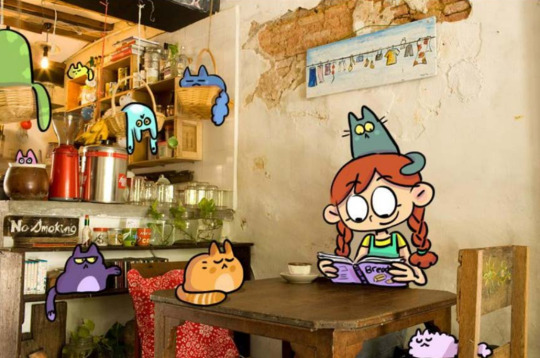
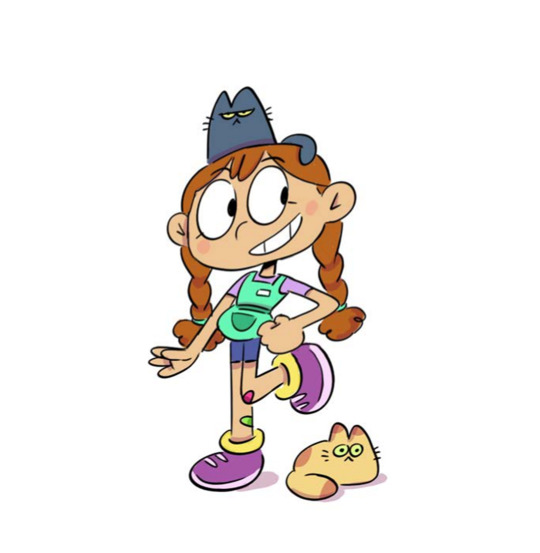
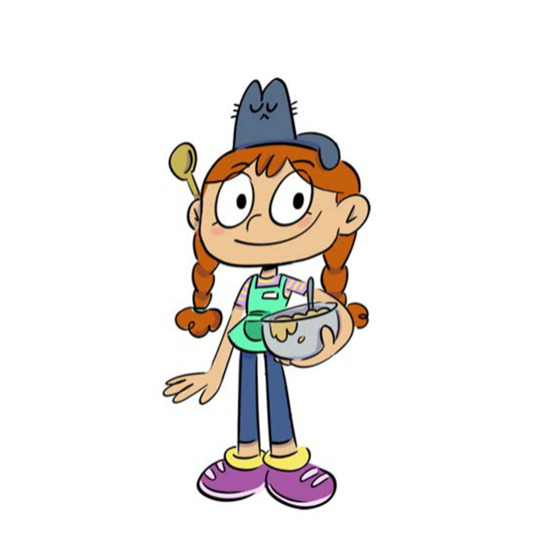

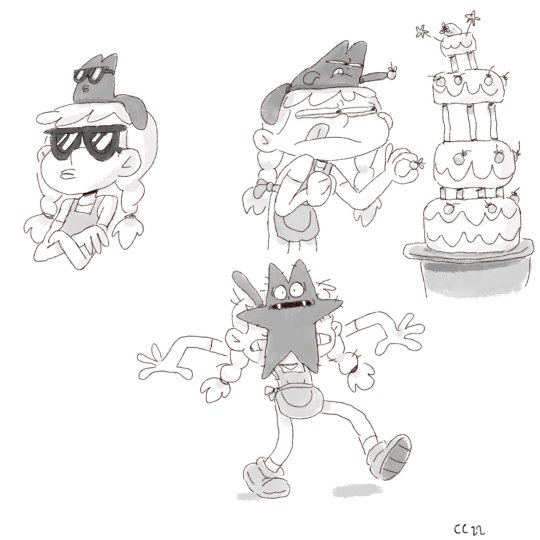
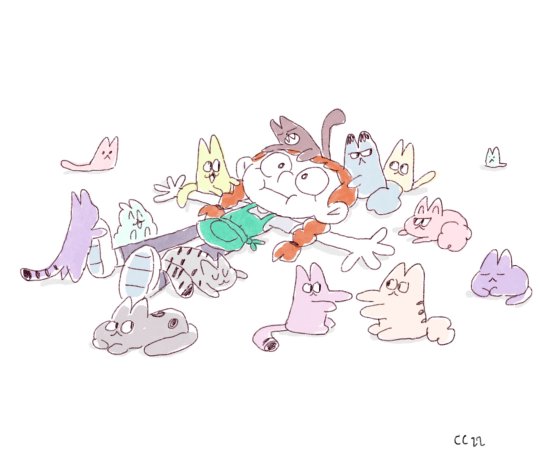
Disney's Katz Café created by Cheyenne Curtis ("Star Vs. The Forces Of Evil","Amphibia","Big City Greens","The Powerpuff Girls 2016") (Circa 2020)
Passed due Bob Iger's return at Disney on 2023 which his reestructure/layoffs lead a one year series orders/renewals freeze at Disney TVA making Katz one of the affected shows to be put on hold/passed despite positive reception from test audiences.
#Katz Café#Katz Cafe#Cheyenne Curtis#Disney Television Animation#Disney TVA#DTVA#Disney TVA Pilots#Disney Channel#Star Vs. The Forces Of Evil#Star Vs The Forces Of Evil#Amphibia#Big City Greens#BCG#The Powerpuff Girls#The Powerpuff Girls 2016#PPG#PPG 16
37 notes
·
View notes